Decorative Walnut Wood Fruit Bowl
by GDS Woodcraft in Workshop > Woodworking
437 Views, 3 Favorites, 0 Comments
Decorative Walnut Wood Fruit Bowl
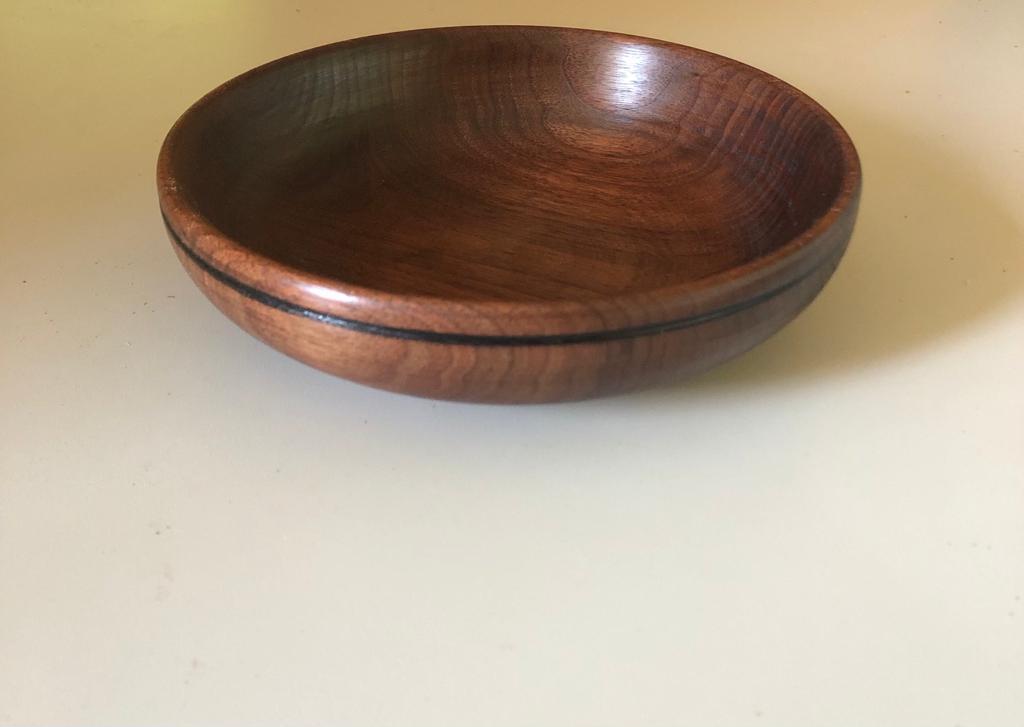.jpeg)
Have you ever wanted that perfect, but simple decorative serving dish that would not only be a functional piece for use but would look classy and be a conversational piece as well? This instructable is for you!! With a little bit of wood turning practice and experience, a lathe, a few turning tools, and a square scrap of wood, YOU can make YOUR OWN wood fruit bowl! You don't' have to go spend top dollar and pay someone to make something that looks good and is special cause YOU made it!
I have a few pictures of the process how I did it but will be explaining a few variations in methods that you can use depending on your tools and equipment
Lets get started!! :)
Supplies
You will need:
1. Your lathe.
2. A faceplate or 4 jaw chuck to hold the wood blank to the lathe.
3. Turning tools. ( a 1/2 in bowl gouge, and a round nose scraper work well, or you can use a square and a round carbide tip tools)
4. A piece of wood (preferably hardwood) we will be using walnut in this example, about 8-9 inches square or larger if you desire, and about 2.5 - 3 inches thick.
5. Sandpaper, steel wool, and a sponge.
6. A food safe finish. ( Beeswax, mineral oil, walnut oil, or a beeswax and mineral oil blend are a few of the ones I've used with good success.
Preparing the Wood for Turning
There are a few different methods in getting your wood ready to turn but the first step for all of them is fairly important to have a much higher chance to success.
First find the center of your piece. If it is a perfect square you can simply use a ruler and draw an X from corner to corner and the intersection of your lines is the center. Or if you have a more irregular shaped piece of wood a center finder comes in handy.
Once you have found the center of your blank a step that greatly speeds up the turning is to cut of the corners off the square on an angle to lessen the amount of wood needed to turn off to get it round. Or if you have a bandsaw you can cut it pretty close to a circle then you even have less roughing to do!
Fastening Your Wood to the Lathe.

Mounting your wood to the lathe for turning the outside. My preferred method for this is using a chuck with a worm screw. simply drill a hole the center in the side of the blank that you desire to be the top that matches your worm screw. (So for me I drill a 3/8 inch hole 1 inch deep.)
But when you start out in a hobby, if you are at all like me, not all of us can afford to get an expensive chuck right away. Don't despair!! When you bought your lathe it likely came with a face plate that threads onto the headstock. Simply place the faceplate on the center of the wood and use screws to screw it through the holes in the face plate into the side that you will be hollowing out later. Note: Make sure to use screws that are the correct size that they dont go into wood that you wont be turning away. And NEVER use drywall screws as they can sheer off easily.
SAFETY FIRST!!!
Now you are pretty much ready to start turning. BUT... there are a few safety things to keep in mind.
1. Make sure to keep your sleeves, loose sweaters, shirts, hair etc. tucked back out of the way. You dont want to get wrapped up in the spinning lathe!
2. In a lot of cases, Especially when turning, carving etc. a sharp tool is a safe tool. A sharp tool will cut cleaner and is a lot less likely to grab then a dull one.
3. Face Protection. Now before you think safety glasses, think what would happen if a whole bowl blank went flying off the lathe and hit you in the face! This is a project that I strongly recommend a full face shield.
Shaping and Making a Recess/tenon.
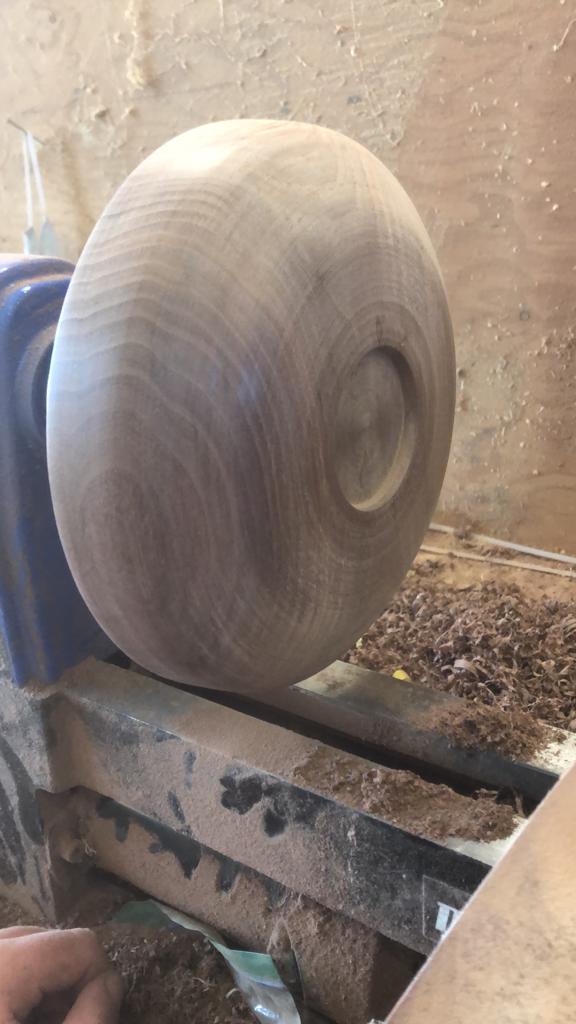.jpeg)
So it helps to come up with a plan for how you want your bowl to be shaped. Looking for ideas online can be helpful.(project pictures on Etsy and Pinterest are good sources)
Once you have an idea what you want your shape to look like use a bowl gouge or square carbide tool and start turning! Something to keep in mind now is how are you going to hold the bowl when you flip it around to hollow it. Depending on what you prefer you can either cut a recess to use your chuck jaws in expansion mode, or you can also use a glue block. Or you can make a tenon which you can clamp your chuck jaws onto. I personally prefer using my chuck and a recess and then just leaving that as the inside of the foot of the bowl. Otherwise you have to turn the bowl around a third time after hollowing to remove the tenon.
Sanding and Finishing (outside)
Once the desired shape is reached you will want to sand the outside of the bowl. Start with 100 grit and work your way through the grits up to 325-400 depending on the finish you are looking for. Then buff with steel wool and then a piece of sponge to shine it up.
Applying finish. If all you will be applying is an oil finish this step can be done now or you can leave it till the end. If you are applying a wax finish you will want to do it now. In this project I simply waited till finished turning and coated it with oil later.
OIL Finish
Take a sheet of paper towel and tear it in half. Fold that half in half and then in half again. Pour a small amount of oil onto the paper towel and hold it to the wood as it is spinning. Repeat until all the outside is coated. Take your other piece of paper towel and do the same thing without more finish to remove the excess and to help burnish the finish into the wood surface. Let sit till dry
WAX Finish
Take your piece of wax and hold it directly to the wood. You will see bits of wax cling to the wood. Take a paper towel and hold it against the wood snugly but do not over do it. You want to generate enough heat that it melts the wax into the wood but if you hold it to snuggly against it can become to hot to hold!
Hollowing
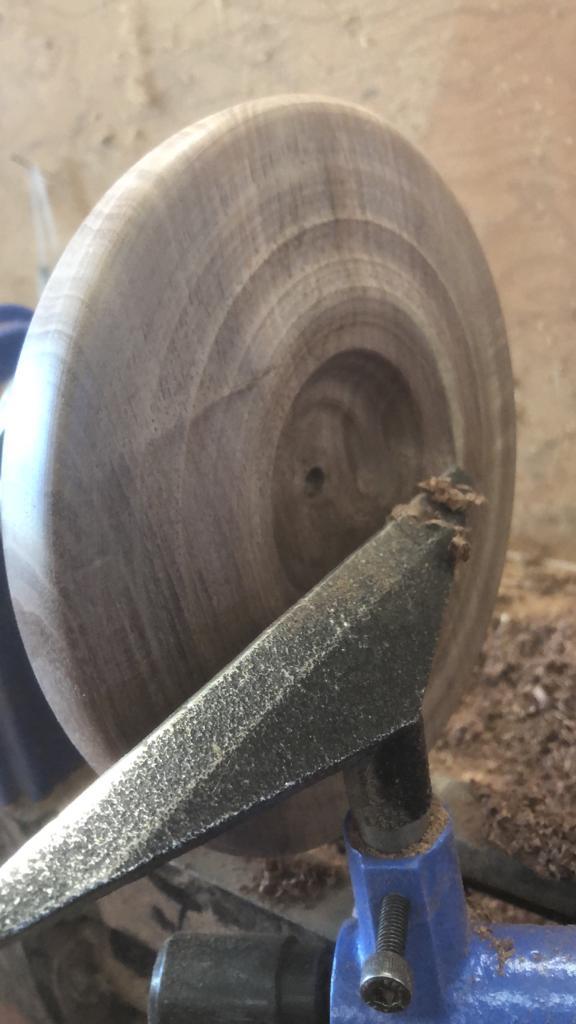.jpeg)
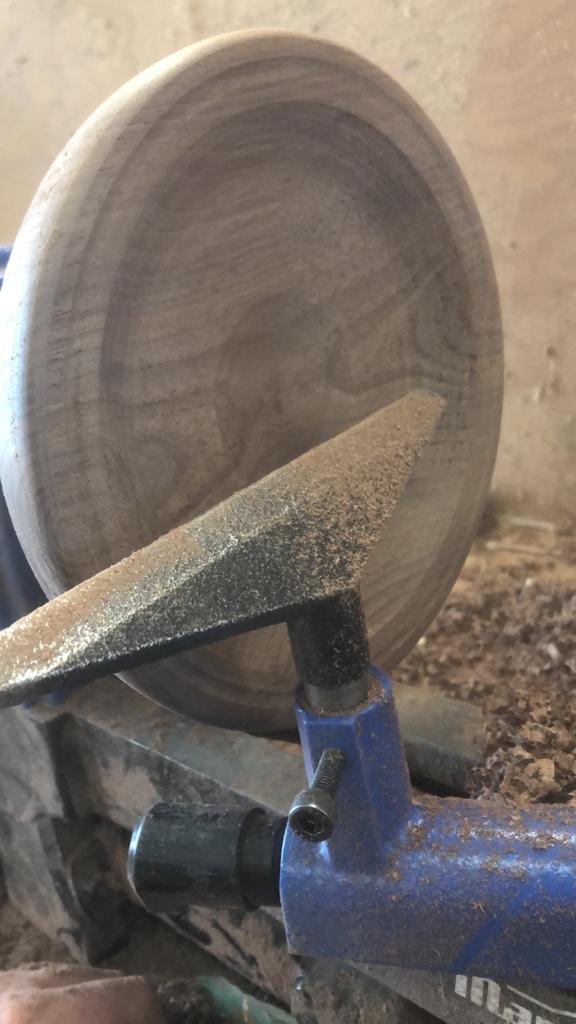.jpeg)
Now its time to turn the bowl around to hollow it. If you are using a tenon, open the jaws of the chuck and place the tenon inside resting the bottom of bowl on the tip edge of the jaws. Make sure this sits up smoothly against because if there is space in between there is not as secure hold and if you get a bad catch with the tool the wood can go flying. (Again I know from experience ☹)
If you are using a recess put the jaws inside and instead of tightening inward expand them so they are pushing outward to the outside of the recess. You can also turn a glue block from a scrap piece of wood that fits the recess and glue it in place.
Using your bowl gouge or round carbide tool, beginning close to the center begin hollowing in a small scooping motion. Almost like scooping ice cream in very small scale. Work your way towards center moving back and starting further out each time until you get to the desired thickness of rim. it is important to turn the sides down as you hollow because depending on how thin you turn your bowl it is very hard to come back and finish it and get a nice finish because the wood will not be as stable and want to flex.
For a finishing pass a round scraper or a negative rake carbide tool can help clean up any tear out.
Sanding and Finishing (inside)
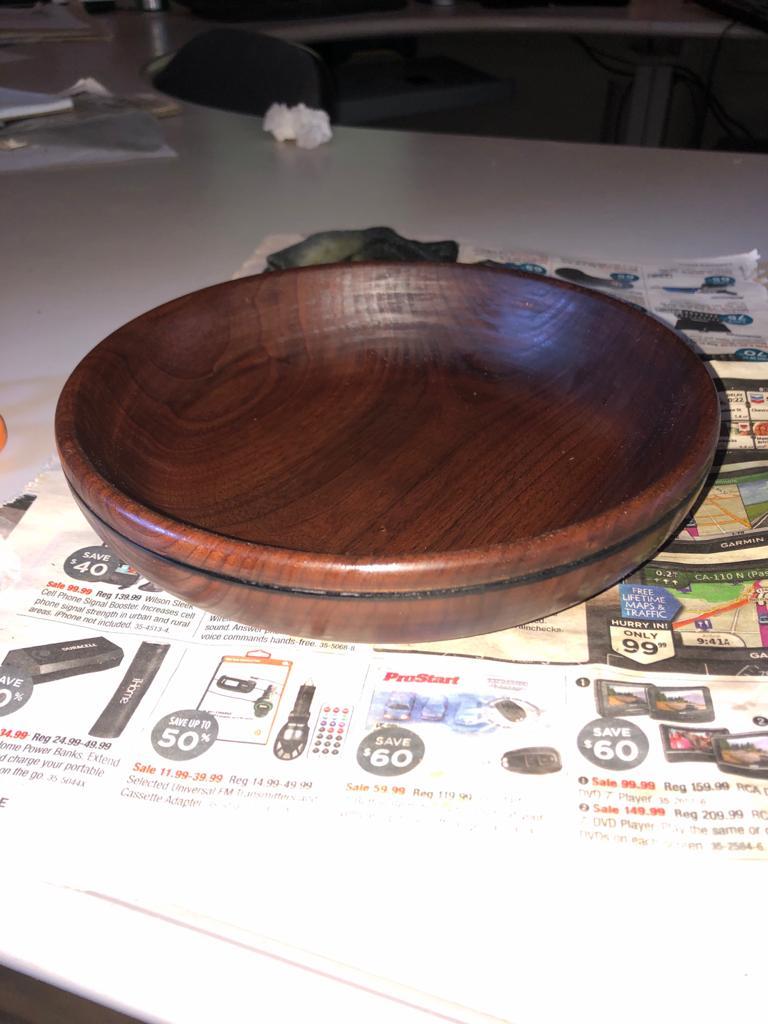.jpeg)
Sanding is the same as the inside. Start with around 100 grit and work through the grits to 325 to 400 again depending on desired wood feel and finish.
Apply finish as for the outside.
APPLYING FINISH OFF THE LATHE
If you want to just apply an oil finish you can do this off the lathe is well.
Simply pour a little oil into the bowl and use a paper towel to wipe it around and to wipe off the excess.
Variations and Aditional Highlights
So now you have turned a beautiful walnut bowl that you can use for fruit or nuts or pretty much anything that you want!!. But why not step it up a notch or two?! There are a few things you can do that add character to your piece. You may have noticed the dark line around the rim in the last picture. This can be easily done by taking a piece of wire wrapped around to pieces of wood at the ends for handles and holding it snuggly against. the wood. Do this until you see smoke and there will be a nice burned ring around the outside.
If you decide to use a wood that is a lot lighter than walnut, using wood dye or stain to add color can bring out the grain patterns especially in something like ash wood.
Or another thing you can use is a chattering tool to add texture to the rim!!
The possibilities are endless. I hope you try this project and it would be interesting to hear other turners suggestions and there favorite bowl turning woods and techniques. Please leave any questions or comments in the section below.
So have some fun and start turning!! ☺